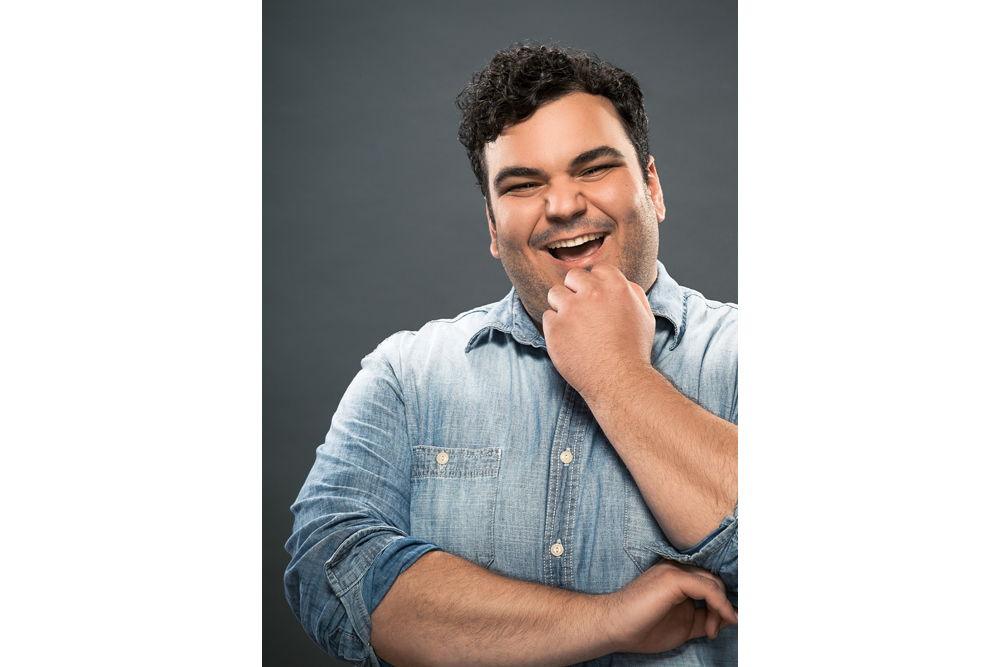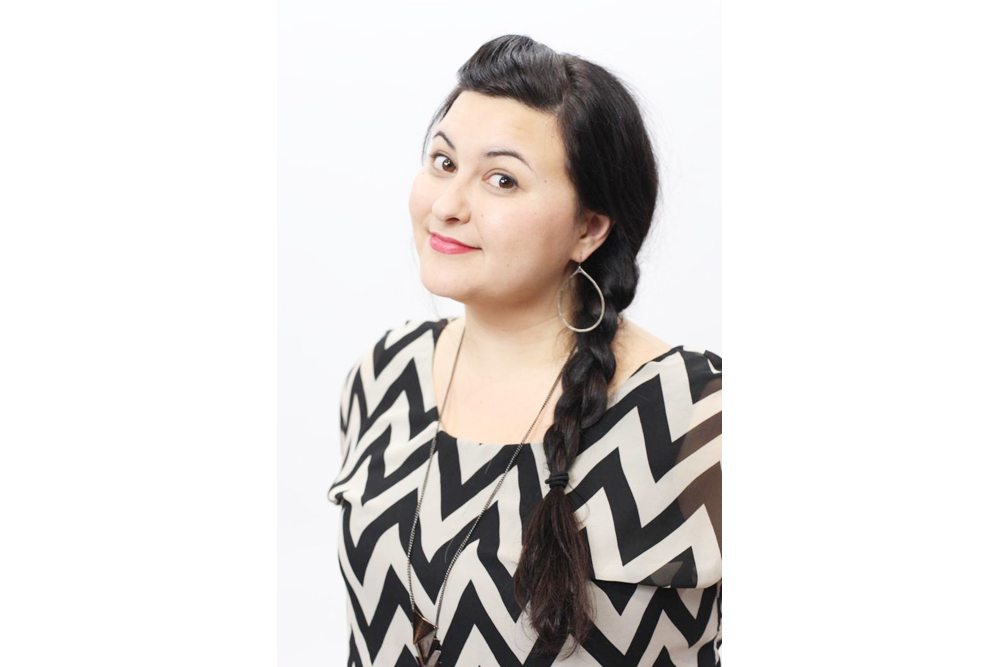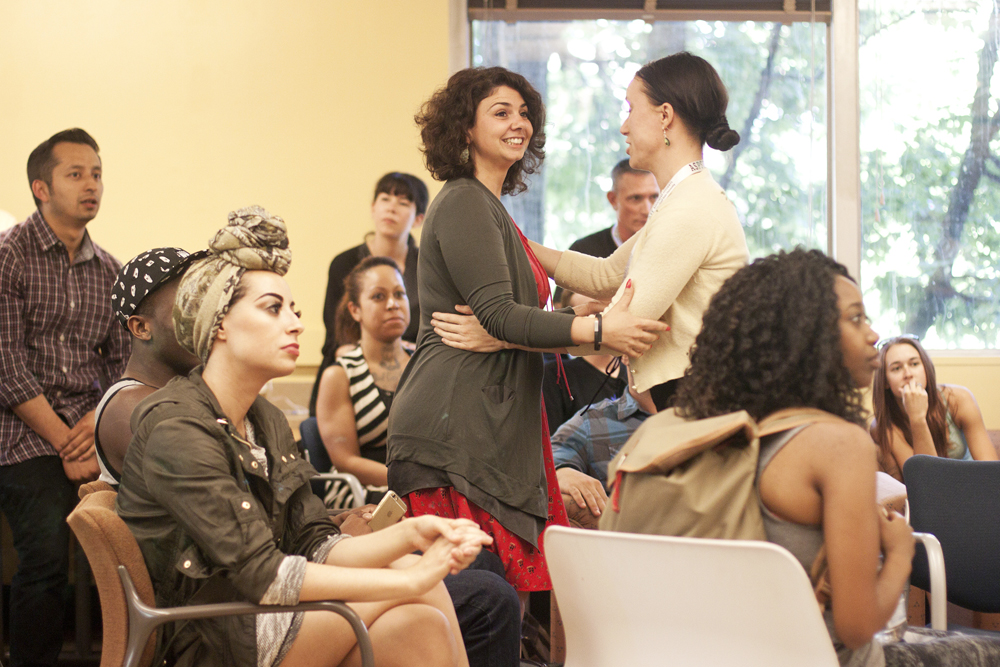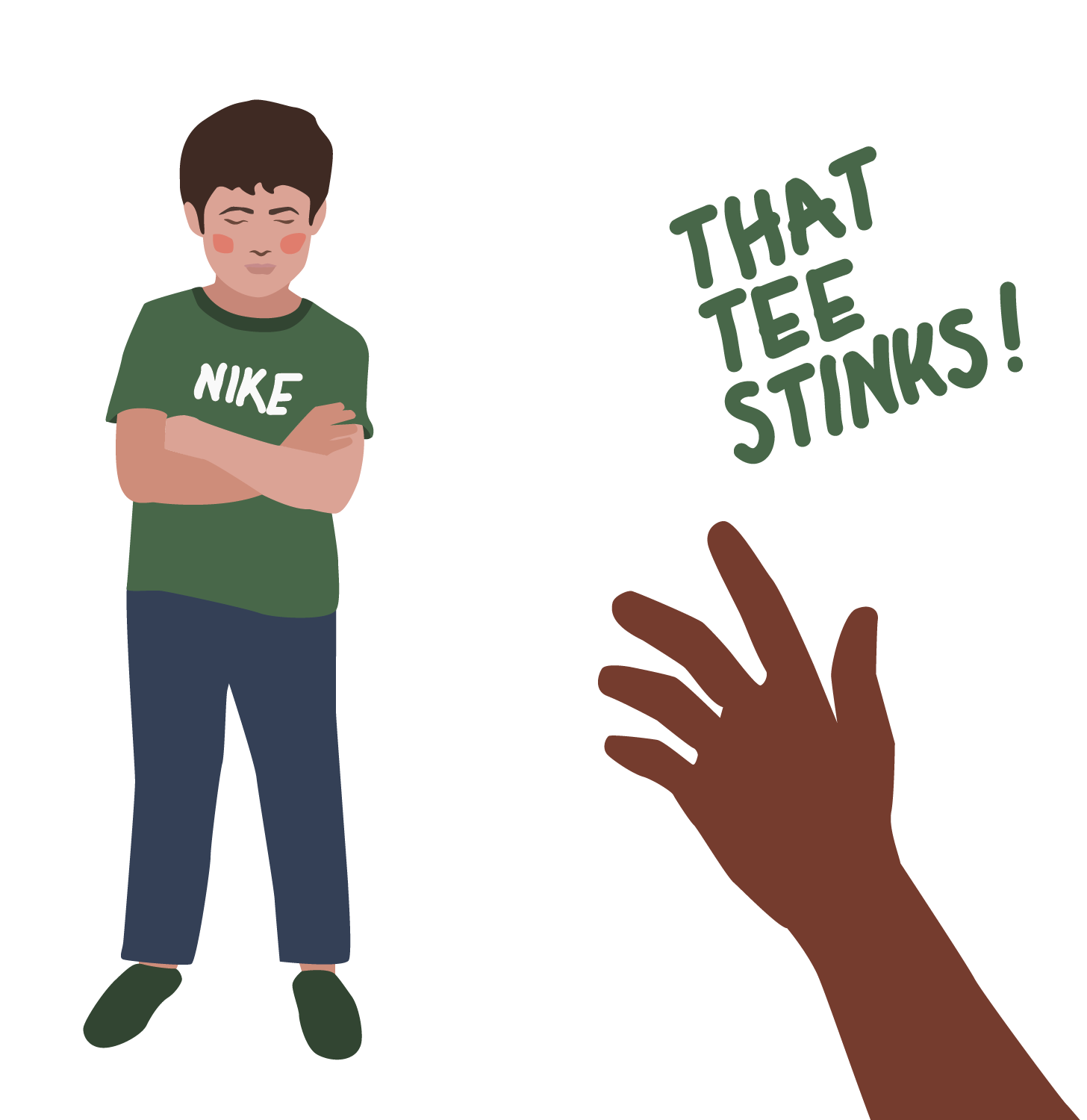Bridgetown Comedy Festival comedian Ian Karmel hails from Portland, Oregon. He currently writes for CBS’s The Late Late Show with James Corden. Before that, he worked on E!’s Chelsea Lately. Karmel has performed at Montreal’s Just for Laughs festival, and he’s made appearances on IFC’s Portlandia. His Portland Mercury column, “Portland as Fuck” transitioned into “Everything as Fuck” after his move to Los Angeles.
Karmel returns to Bridgetown this year with several performances, May 7–10.
Kill Rock Stars Presents
Friday, May 8, 11–11:59 p.m.
Doug Fir Lounge Kill Rock Stars Stage
Portland’s Kill Rock Stars record label has compiled a lineup that features the perfect sampling of local and visiting comics. Hosted by Portland comic Anthony Lopez, featuring Kurt Braunohler, Kyle Kinane, Ian Karmel, Amy Miller, Steven Wilber, Nathan Brannon and Elicia Sanchez.
Funny Over Everything
Saturday, May 9, 10–11:30 p.m.
Norse Hall’s Audible Stage
The original creators of Portland’s popular “Funny Over Everything” show are teaming back up to bring you a stellar lineup. Sean Jordan hosts Michelle Buteau, Kyle Kinane, Ian Karmel, Beth Stelling, Chad Daniels, Noah Gardenswartz and Shane Torres.
Karmel, a “2010ish” Portland State graduate, said he got his start in comedy by taking improvisational acting classes from his uncle, Scott Parker, who teaches in PSU’s theater department. Karmel fell in love with improv, dropped out of PSU and moved to Los Angeles, where he studied at the Groundlings School and performed at Upright Citizens Brigade Theater.
After struggling to find work in LA, Karmel returned to PSU and finished his degree. He considered getting a law degree before he took the totally responsible life path toward stand-up comedy.
Colleen Leary: Now that you’re back in LA actively working in comedy, do you stand by your decision to finish your degree?
Ian Karmel: Yeah. If I hadn’t come back to Portland, I never would have started doing stand up, I don’t think. At least not in earnest. And I wouldn’t have been able to be a part of the comedy scene blowing up in Portland in the way it did with me and Ron Funches and a few other people. So I got to be a part of that, which is really cool. And I started writing for the Mercury after I moved back from LA and started doing the Blazers’ post-game show. So I’m incredibly glad I came back. It ended being totally the right thing.
Plus, if you’re doing comedy you want to learn as much as you can. So college is a good thing. The more you learn about, the more you know, the more you can joke about. So I think going to school is only a good thing for comedians.
CL: What was the transition like for you going from Portland to LA the second time?
IK: For me it was a kind of strange transition because I got hired on a TV show writing, like, immediately—on Chelsea Lately, which is no longer on the air. But I didn’treally get to jump into the stand-up scene as much as I wanted to. Luckily, I had been coming down from Portland for a year or so. It’s good to come down here and do shows and get accilimated to the scene and try to get myself in front of the right people.
But I will say the crowds here are not impressed as easily, because LA is full of all the best comedians in the world all the time. And there’s so many other things to do.
And I don’t even know if that’s it; a lot of the times the shows you do there’s a bunch of agents and managers and people who are in show business in the crowd, and they just don’t laugh as much. They’re not as willing to have a good time. Portland people, I think, are showing up wanting to have a good time, more so they want to laugh. They want to see a good show.
I guess the big difference down here is Portland is almost like a womb—like a comedy womb—where it really nourishes you, it lets you develop. And down here, it’s a little scarier and little harder to take chances because you’re in front of decision makers all the time. You’re in front of industry, you’re in front of people who book shows and cast television shows and stuff like that. So you see people who aren’t trying quite as hard.
Comedy in Portland is like the pure shit, you know. And down here it feels like there’s a lot of other factors mixed in.
Also, in a way, all the money is down here, too. So you have to come here or New York if you want to make a living that’s sort of beyond ‘I can barely pay my bills off comedy.’ I was in Portland writing for the newspaper, doing TV for the Blazers and doing stand-up comedy all the time, and I still barely scraped together a living—which is the unfortunate reality. And it was a beautiful living, but at some point you have to be like, ‘Oh, shit. What if my car breaks down, or what if I break my leg?’
As nourishing as Portland is comedically, at some point you have to get out. Luckily, Portland has the kind of comedy scene that people from all over the country like to come to. They love the crowds in Portland because they’re smart, funny people who are going to understand weird references. They’re just a joy to perform in front of.
So comedians from all over the country come to Portland, so when I moved down to LA, I already knew most people from performing with them in Portland or at Bridgetown, specifically. Which is one of the great things Bridgetown does, for Portland comedians. It introduces them to people who are going to be their peers in the next few years.
CL: Are there any Bridgetown shows you’re booked on that you’re particularly excited about?
IK: I’m really looking forward to the Kill Rock Stars show because I’m on there with some of my really good friends. It’s cool to be part of the Kill Rock Stars family and to be doing stand-up on their show at Bridgetown. They’re putting out my album, which is a dream come true. Super amazing and really weird. I was on my high school football team, and now to have a Riot Grrrl record label put out my record is super weird, but also very, very cool.
So that show’s going to be a lot of fun. The whole thing is fun. The atmosphere of walking up and down the street, seeing your friends, seeing other comedians—knowing you can pop into any open door and there’s probably going to be a stand up show going on, and it’s definitely going to have really funny, unique comedians. There’s no festival like it. They do such a good job of mixing known entities with comedians who are going to be known entities in three or four years. It’s so much fun.
If you do stand up, there’s a good chance you’re also a stand-up comedy fan. I am definitely one of those people who’s also a stand-up comedy fan. So it’s just the best.
CL: What about the Funny Over Everything Show on May 9?
IK: Oh, of course…that Funny Over Everything show, that’s me and two of my best friends. It’s the show we started in Portland a few years ago. It’s me, Sean Jordan and Shane Torres. Do you have the line up?
CL: It’s Michelle Buteau, Kyle Kinane, you, Beth Stelling, Chad Daniels, Noah Gardenswartz, Shane Torres and Sean Jordan hosting.
IK: Oh my God, what a lineup. It’s amazing. Kinane—for Sean, Shane and I he’s like our comedy older brother. He’s brought us all on the road and done so much for us. That’s just a super-cool line up.
And then, it’s so cool to come back to Portland, now Shane’s out in New York and Sean’s still in Portland, but he’s good enough to be in LA or New York with us.
So for the three of us to get together, it means so much and it’s going to be so fun to see those dudes. It’s just fucking cool. We started that show sitting at Crema Coffee Shop, and the Hollywood Theater had come to me and been like, ‘Hey, do you want to put on a show at the Hollywood Theater?’ And I had no idea what to do.
So the three of us sat there and decided we were going to try to bring amazing comedians into Portland. For it to still be alive three years later and part of Bridgetown Comedy Festival, which has been such a big part of all of our careers, it’s super cool to get to do it. It’s one of those shows that means more than just the stand up. And I’m sure we’ll have something special planned for it.
Not special in a corny way, but special in the crowd is going to have a really fucking good time at that show.
CL: Haven’t you been on Competitive Erotic Fan Fiction shows in the past?
Yeah, I won it at Bridgetown the last two years. And then this year there was a scheduling conflict. But I might have to figure out a way to get over there and still be a part of it, because that’s one of my favorite shows at Bridgetown every year.
CL: People like to say Bridgetown is like summer camp for comedians.
IK: Yes, that’s the thing people love to say. It kinda is like that. You know, you kind of go off to your individual shows, and then everybody gets together at the after party at night and gets drunk and does drugs.
And so, yeah, I guess it’s like summer camp with beer, drugs and free Voodoo doughnuts.
CL: Do you think that comedic nurturing in the Portland scene—I always hear people talk about “safe spaces and safe rooms”—do you think that might stunt people if they’re trying to perform outside of Portland?
Yeah. It will. I guess it depends what the performer wants to get out of performing comedy. So, limiting the audiences you’re going to perform in front of will inherently delay your development in the sense of being able to please everybody. But I guess the beautiful thing about—not just comedy’s progression, but the way entertainment is progressing—is everything is niche now. There’s so many different television channels, and there’s YouTube, and all that stuff and you can find your audience. You don’t have to go on Leno and make 5 million people laugh. You can be a comedian who appeals to 50,000 people. But those 50,000 fucking love you and support you and they’ll buy your album and come see you when you perform.
So, in terms of safe spaces, I mean, I guess I wouldn’t want to go somewhere that’s going to limit what I have to say. I’d like to be able to talk about stuff and sort of trust myself knowing that I would never come out and say anything that would intentionally try to trigger somebody or upset someone. And I’d like to be able to rely on myself and think I’m a good person, but I would never hold it against someone if they want to start a room that’s like a safe space. Good for them. And if they bring a crowd out to it, and build a community around that safe space, I think it’s wonderful and beautiful and I would perform there. I would just be selective about the material I did.
I don’t know—I think they’re fine. I don’t think they’re ruining comedy. I guess this is a bigger issue, but I think there are people who are worried that censorship and political correctness and all that are ruining comedy. And I just don’t agree with that at all.
People can tell you that they don’t like what you have to say. But they can’t stop you from saying it. If you look at all the people who’ve gotten in trouble—like Daniel Tosh got in trouble for making a rape joke, and if it were me up there, I never would have said that. Daniel Tosh still has two television shows on Comedy Central, you know what I mean?
The alarm is so overblown. Nobody’s stopping people from saying shit, and nobody’s ruining the careers of people who do occasionally cross that line. Dave Chappelle got in trouble for making some jokes that were perceived as anti-transgender, and if he performed in fucking Olympia, Washington, tomorrow night, he would sell out 10 shows in their biggest venue. If anything, I think it’s good to hear people out on this stuff.
I think you should never take someone’s word as religion when they say something’s offensive. Because offensive isn’t a fact, it’s an opinion. But I think it’s good to hear people out on that stuff.
You know, the comedians who are fighting tooth and nail for the right to tell rape jokes, I have yet to hear a man tell a rape joke that was worth fighting for. I just haven’t heard that joke yet. It’s a fucking unicorn.
So I understand the intellectual spirit of the debate, I just think people spend so much wind on this thing that is like a monster under the bed. It’s not a real thing. Censorship isn’t something coming to kill comedy. It’s not coming to end anyone’s career. Comedy is healthier right now than it has ever been. And in so many different ways.
This is a landscape where Jim Norton can be famous and—I can’t even think of someone who’s a very progressive comedian.
CL: Hari Kondabolu?
Oh, what a wonderful example. Hari is so fucking funny and so progressive—And W. Kamau Bell and a lot of those people get to have careers, and Jim Norton gets to have a career and if everyone’s finding their audience, comedy is healthier than ever. Certainly being considerate of what other people have to say isn’t going to hurt the fucking art of comedy. Fuck—the more people we can listen to, the more life experiences we can get, not only on the stage, but into the ears of the people who then go on stage.
What we love about comedians, I think, is we are prisms through which the world is reflected. If you can reflect more of the world through those prisms, comedy is just going to be better. So, yeah I think the people who are worried about censorship are fucking full of shit and just want to make noise. I think again a lot of people are frustrated that they’re not funny enough to hack it and want to find something to blame. And the thing they blame are so-called “social justice warriors.” And I think that’s bullshit. If you were funny enough you’d find your audience.
That’s the thing about comedy. It’s ethereal. Your ascent is very ethereal. There aren’t a lot of moments where you can be like, ‘Okay, I’m progressing in the right direction.’ Careers break in the snap of a finger. So when people see themselves stagnate, I think they look for things to blame.
So I think a lot stuff can get pinned on censorship or whatever comes from some of that fear.
Karmel’s Bridgetown Recommendations:
IK: I guess there’s two recommendations. If you’re a comedy fan in Portland and you already know who all the local people are, definitely go see Kurt Braunohler. He does amazing things at his show that extend beyond the realm of just stand up. Braunohler’s show is an experience.
Kinane is amazing. He’s one of my favorite stand up comedians ever, and he’s such a perfect fit with Portland. He’s not from there, but he totally could have been. He’s from Chicago, but he’s definitely one of us. So he’s definitely a recommendation.
Beth Stelling, she’s one of my favorite comedians, too. So many of us are yelling, loud comedians. She’s a little more dialed back and her pace is a little bit slower. Her jokes are so amazing. She’s just a joy to watch. I would make sure I went to see her.
Those are three names outside of Portland I would recommend. If you don’t usually get a chance to go see comedy in Portland, make sure you check out people like Amy Miller, she’s so funny and such a good stand up comedian. Bri Pruett is a Portland comedian who is so, so funny. She might not be in Portland for too much longer, so I think people should make sure they take the opportunity to go see Bri do stand-up. And then Stephen Wilber is a totally weird original voice.
The best thing about Portland comedy is that it really encourages you to become the most You possible. I guess that’s not something that happens in every city. Like some cities, you try to make people laugh however you can. So sometimes people will come up doing racist stuff or sexist material. And even just hack material, stuff that’s not original. The thing that I love and am proudest about the Portland scene is that it encourages you to be original more than anything and to find your voice and do the best version of your voice.
I think the three comedians I just named are three really good versions of what Portland is all about.
Four-day passes for the festival are $99 and available at bridgetowncomedy.com.
To see Karmel’s website, click here and to see his Bridgetown schedule click here.
Editor-in-cheese





